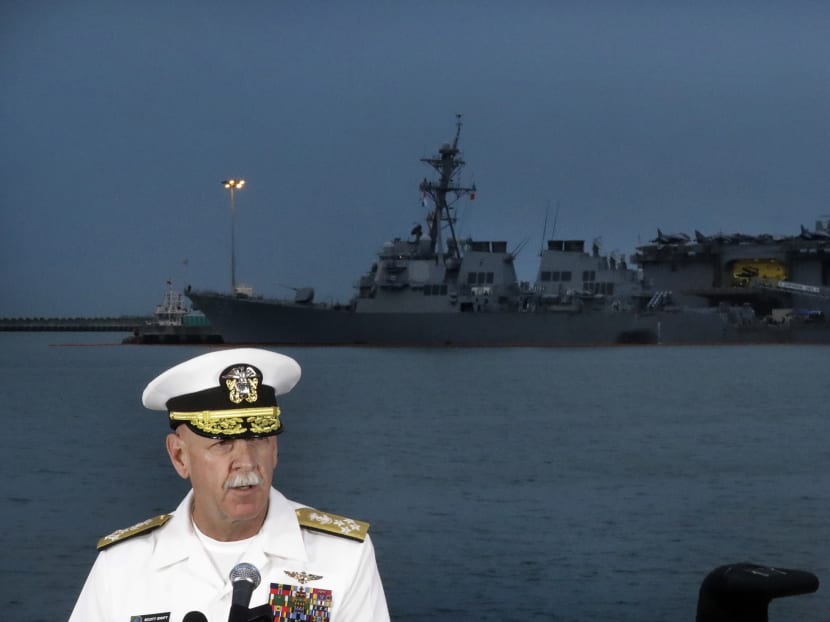US Navy not ruling out cyber attacks as cause for collision
SINGAPORE — A spate of incidents involving United States warships in Asia, including a deadly collision this week off Singapore, has forced the US Navy to consider whether cyber attackers might be to blame.

Commander of the US Pacific Fleet, Scott Swift answers questions during a press conference with the USS John S McCain, left, and USS America docked in the background at Singapore's Changi naval base. Photo: AP
SINGAPORE — A spate of incidents involving United States warships in Asia, including a deadly collision this week off Singapore, has forced the US Navy to consider whether cyber attackers might be to blame.
While some experts believe that being able to engineer such a collision would be unlikely, given the security systems of the US Navy and the logistics of having two ships converge, others say putting the recent incidents down to human error and coincidence is an equally unsatisfactory explanation.
The USS John S McCain collided with a tanker earlier in the week as the warship was on its way to make a routine stop in the city-state, tearing a huge hole in the hull and leaving 10 sailors missing and five injured.
Chief of US Naval Operations Admiral John Richardson said on Monday that the review of the incident would include the possibility of cyber intrusion or sabotage, although there were “no indications right now”.
“We’re looking at every possibility,” he said, adding “as we did with Fitzgerald as well.”
Just two months earlier in June, the USS Fitzgerald and a Philippine-flagged cargo ship smashed into each other off Japan, leaving seven sailors dead and leading to several officers being disciplined.
There were also two other, lesser-known incidents this year — in January USS Antietam ran aground near its base in Japan and in May, USS Lake Champlain collided with a South Korean fishing vessel. Neither caused any injury.
Admiral Scott Swift, commander of the US Pacific Fleet, has refused to rule out sabotage in Monday’s incident. “We are not taking any considerations off the table and every scenario will be reviewed and investigated in detail,” he said.
Analysts are divided on the issue, with some believing US Navy crews may simply be overstretched as they try to tackle myriad threats in the region, and pointing to the difficulties of sailing through waterways crowded with merchant shipping.
But others believe something more sinister may be going on.
Mr Itar Glick, head of Israeli-based international cyber security firm Votiro, said the spate of incidents suggested that US Navy ships’ GPS systems could have been tampered with by hackers, causing them to miscalculate their positions.
“I think that hackers could try to do this, and if they are state-sponsored they might have the right resources to facilitate this kind of attack,” he told AFP.
Mr Glick, who says he used to work in cyber security for Israeli intelligence, said that China and North Korea would be the most likely culprits.
He pointed to a recent incident in June of apparent large-scale GPS interference in the Black Sea to illustrate that such disruptions are possible.
Pyongyang has also been blamed for recent cyber attacks, including the 2014 hack of Sony Pictures and the theft of millions of dollars from the Bangladesh central bank.
The US has repeatedly accused China of carrying out cyber attacks on American companies, particularly to steal intellectual property.
Beijing, however, says it has also been the victim of such attacks.
Mr Jeffery Stutzman, chief of intelligence operations for US-based cyber security firm Wapack Labs, told AFP he thought the possibility of a cyber attack being behind the latest incident was “entirely possible”.
“I would be very doubtful that it was human error, four times in a row,” he said, referring to the four recent incidents.
Still, other observers believe such a scenario to be unlikely.
Mr Zachary Fryer-Biggs, from defence consultancy Jane’s by IHS Markit, said that even if something went wrong with the GPS system of a ship, other safety mechanisms should stop it from crashing, such as having people on watch.
“The collision only occurs if several other safety mechanisms fail,” he said.
Mr Daniel Paul Goetz, from US-headquartered cyber security firm Lantium, added: “The US military uses a GPS system that is highly secured, highly encrypted — the chances that somebody could take over a US military ship is very close to zero.” AFP






